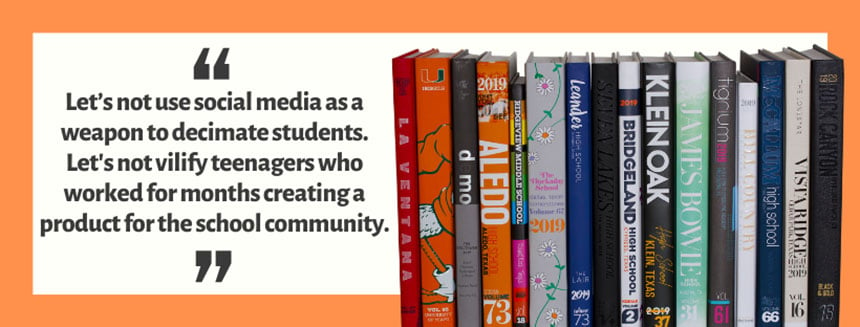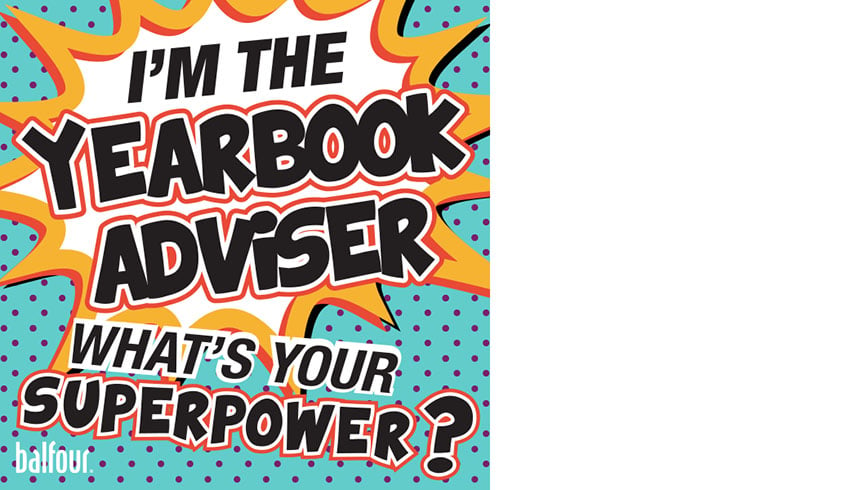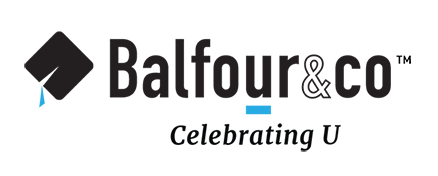
We love distribution day and the excitement of sharing yearbooks with the community. But we also worry about complaints. Hopefully, the unusualness of this year will make people kinder and more appreciative. But just in case, we’ve have three suggestions for dealing with negativity.
1. Ask for grace.
There’s no such thing as a perfect yearbook. Let me say that again.
There’s no such thing as a perfect yearbook.
Just the sheer size of the project and the thousands of quotes, pictures, names and bits of information make it impossible for everything to be 100 percent accurate. Heck, look at Game of Thrones. Even with a $15-million dollar budget and two years of production, almost 40 pairs of eyeballs missed a coffee cup sitting by Daenerys Targaryen.

After rampant social media discussion about a missed coffee cup, HBO used humor to defuse the goof. They commented on Twitter a day after the episode’s airing, noting “News from Winterfell. The latte that appeared in the episode was a mistake. #Daenerys had ordered an herbal tea.” Photo by HBO
Unfortunately, in our quick-to-judge, everything-is-an-outrage culture, your audience may not be so understanding. So, it’s important to ask for grace.
Whether you create a PSA, splash messages across social media or add a mistakes insert, admit your humility to the audience. Acknowledge it’s not a perfect publication. Let them know the book was created by imperfect teenagers, students learning on the job. It just so happens their mistakes are put on public display for the world to see…FOREVER.
But just like we don’t chastise the lead actress for flubbing lines in the school play or call out the linebacker for missing tackles, let’s not attack our student journalists either. Let’s not use social media as a weapon to decimate students. Let’s not vilify teenagers who worked for months creating a product for the school community.

If they have serious concerns, ask them to reach out to you, the adviser, privately. After all, it’s the theater director’s job to address flubs with the actress. It’s the defensive coordinator’s responsibility to discuss poor tackling with his player.
Do we need to know about mistakes? Absolutely. Do we need to figure out ways to have less? Definitely. Do we need that discussion to be on a public platform to embarrass students? Never. Ask for criticism to come in a more proper form, and then use that feedback to have an even better product next year.
2. Get the message out there.
Format your message in your favorite medium and get it out to the world. If you can swing it, put it in every format possible—on paper, on your voicemail, in your email reply, on social media (this is fantastic opportunity to have creative, returning staffers make hilarious TikTok videos).
Our favorite method? An insert you add to each book that addresses the “misteaks.” It’s a chance to remind people to check for physical issues with the book (ripped, missing or upside down pages) and also ask for understanding and grace with the mistakes. If you haven’t seen our extensive coverage on handling mistakes, check out the post from last April. It has great ideas for pre-empting complaints, adding inserts, dealing with social media negativity and solving grievous issues.

Shawnee Heights High School always includes an insert with book distribution to remind buyers to check for physical damage and be understanding about mistakes. Photos by Jeni Daley
We also love the idea of creating a PSA video to share on social media. Maybe it’s a version of the Sarah McLachlan ASPCA sad animal video or Jimmy Kimmel’s mean tweets, but there’s definitely a way to infuse humor to defuse angry voices. Even NBC’s “The More You Know” PSA-type campaign is a good strategy—staffers talking straight to the cameras provides a real talk, real empathy vibe.
Normally, we’d also advise you to change your voicemail and have your principal send a supportive email to teachers (again, see last year’s great post). But with school out, that’s not really helpful. However, changing your email reply is.
As you set up your “Out of Office” message for the summer, include updates about yearbook distribution, leftover books and mistakes. This is a great chance to provide helpful information and remind parents that regardless of all the hard work and fact checking, there will still be imperfection.
3. Don’t take it personally.
The sad news is, even with these precautions, haters are still going to hate. You’ll stave off some people, but a few obstinate souls will charge on, forgetting about decorum and grace. So, give yourself a little grace. Don’t take it personally.
We know that’s incredibly hard to do. But it’s important. You have done the best job you can. And this year especially, in the worse circumstances possible. And yet, you and your students, rose to the challenge.
Try to focus on all the great things you did with the yearbook. Appreciate the praise and the wonderful comments. Keep an eye on the complaints so you can resolve serious issues (talk closely with your representative). Analyze the negative commentary later (much later); decide if it’s valid and how you could make improvements. But don’t let the complaints ruin the incredible feat you’ve accomplished. You taught classes, inspired students, led a newsroom AND ran a business. You created a product that’s the only permanent record of the year, one the school community will enjoy and benefit from for years to come.
You are a SUPERHERO. Don’t let anyone tell you otherwise.


